Revisited: Reality Bites, 20 Years On
Gen X’s defining document, or the most infuriating cast of early-‘90s jerks ever?

1994. Wet Wet Wet’s ‘Love is All Around’ was the biggest song of the year, America was recovering from a recession, Kurt Cobain got intimate with a shotgun, and Forrest Gump forever changed how we spoke of boxed chocolate.
And if Reality Bites was to be believed (and it was), we were all going to become petrol-station dancing, casual-sex having, rooftop-drinking slackers who quoted Cool Hand Luke, hated Ben Stiller, and played in bands that covered Violent Femmes songs. Well, one out of six isn’t bad*.
Few movies try to signpost a generation as vigorously as Reality Bites did that year. Fewer still are so painfully self-aware. For all its missteps, watching the film 20 years on still presents an interesting, if rough, sketch of a generation that tried hard to not be defined. Or rather, didn’t try at all — which subsequently defined them.
Directed by Ben Stiller (his first time behind the camera), and starring Winona Ryder and Ethan Hawke, Reality Bites pitched itself as a window into the lives of a group of 20-something college graduates struggling to figure out their roles in the world. To Stiller’s credit, the movie never once used the phrase Gen X, and tried to distance itself from the ‘defining a generation’ claims that were made in its lead-up and wake — but calling Reality Bites ‘just a rom com’ would be like saying Easy Rider is about sweet motorbikes.
Watching it now, it also feels like an indie movie figuring out how to parlay that perceived indie coolness into bucketloads of cash. You can hear producers in a boardroom somewhere — “imagine a cross between Singles and Sleepless in Seattle” — with dollar signs flashing in a studio honcho’s eyes. But its intentions were honourable: written by Helen Childress, herself in her early 20s at the time, and based on the lives of her friends Houston, Texas, Reality Bites stands as a glimpse into the real world milieu of anyone navigating their early 20s — overwrought philosophical banter included.
Plus, every time ‘My Sharona’ has been heard since, dancing has followed.
*The Stiller one, obviously.
–
The Waif, The Poet, The Yuppie, The Wry One, And The Gay One
The kids from Breakfast Club really grew up, huh?
The story centres around the trials and tribulations of Lelaina, who’s struggling with adult life. She worries about not being able to change the world; she worries about her job, about her parents, about love, about creating art (her video documentary of her friends). She worries about everything, basically.
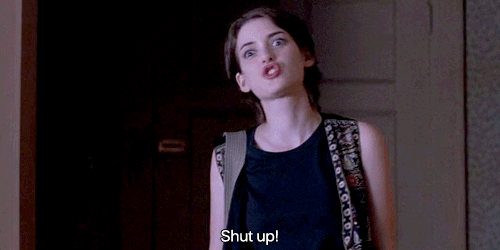
Winona Ryder, at her iconic, waifish ‘90s-girl apex — she was even dating Dave Pirner from Soul Asylum! Who has a cameo! — does a good job of channelling early-20s directionless confusion. If there’s one thing she does great, it’s cute and uncertain.
And red tops, apparently.
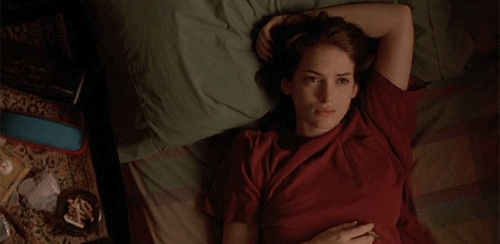

Not helping matters is Troy Dyer (Hawke), the greasy-haired wannabe-ironic philosophiser and erstwhile manwhore. He’s an ‘artist’, you see; the type of guy who answers the phone saying, ‘You’ve reached the winter of our discontent’.
Hey Troy, what’s the definition of irony?

Thanks, bud.
The ‘complicated’ relationship between Lelaina and Troy — set up in the iconic opening rooftop scene — gets even more complicated when yuppie TV executive love interest Michael (Stiller) enters the frame with big hair, bad suits, an obnoxious car phone (what a square!), and dubious pop art sensibilities.
On the periphery are friends/roommates gay Sammy (Steve Zahn) and wry Vickie (one of the best female characters of early-’90s cinema, performed by a made-for-the-role Janeane Garofalo), providing insight, car hangs and petrol station dance scenes.
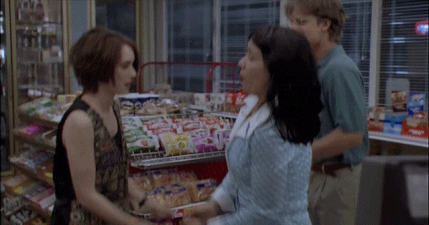
In fact, Vickie and Sammy are woefully under-used. You get the feeling that, were Reality Bites turned into a TV show now, they might be the two main characters, and the Lelaina-Troy-Michael love triangle would be relegated to an annoying side note.
Because at the end of the day, the entire movie is about generational insecurity. No character has a clear idea about what they’d like to do. When asked, Sammy memorably states, “My goal is… I’d like, a career, or something”. Each character is rudderless, trying to — as Lelaina puts it — “find their own identity, without any role models or heroes or anything”.
The Cultural Shift Of The Early ’90s
Perhaps the most refreshing thing about Reality Bites was its decision to examine taboo topics as everyday things: divorce, casual sex, AIDS, recreational drug use and homosexuality. In particular, Vickie’s AIDS test and Sammy coming out to his mother are handled with realistic maturity that reflected wider societal change. Sure it’s irksome that Vickie’s sexual appetite is punished by an obligatory AIDS scare, but for 1994, it’s positively forward-thinking.
The film also captures one of the first generations to deal with the spiked divorce rates of the ’70s and ‘80s. This might be one of the more lasting messages of the movie: that having fucked up parents (who try to kill themselves, or are tough, distant and now have cancer) can make life exceptionally difficult to navigate. Reality does bite and, as Lelaina says, “the world doesn’t owe you any favours”.
One the biggest motifs of the movie, though, is how reflective of pop culture it is, while trying so hard to seem detached and sarcastic. Troy is forever spouting off brand catchphrases in his ‘I’m trying to be witty and acerbic’ way, and the references come thick and fast: Coco Puffs, Good Times, Coke, McDonalds, Fruit Loops, The Brady Bunch, Evian, Melrose Place, Frampton Comes Alive.
Even the movie poster — shot, incidentally, by music photographer Anton Corbijn — lists defining early ‘90s buzz words: ‘Credit cards’. ‘Relationships’. ‘Channel surfing’. ‘Safe sex’. ‘Decaf’(!?). ‘Romance’. ‘Trust’. And, of course, as it was so knowing and ironic, it also included ‘subliminal message’, ‘movie poster’ and ‘buzz words’.
How ball-punchingly post-modern. And how very, very someone’s idea of how the Gen X couldn’t be sold to by being sold to. “We’re in on the joke! Get it!?”
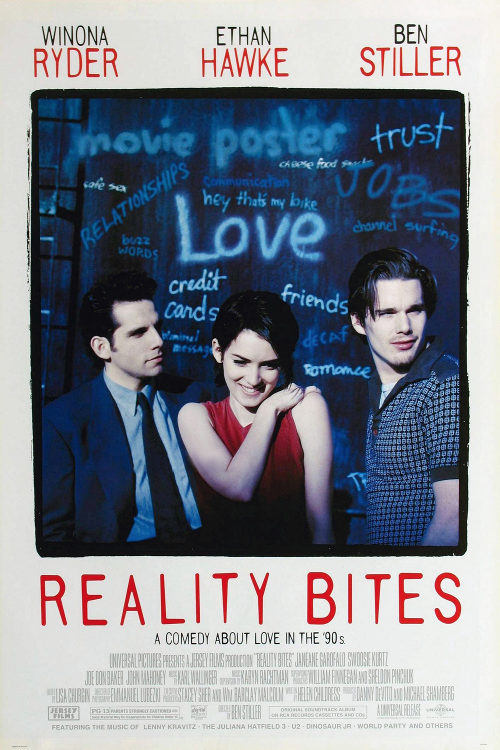
For a generation more self-aware, knowing and reflexive than any previous one, goddamn they were obnoxious.
Still, Vickie’s fear of being “the one with AIDS” on Melrose Place, and Lelaina’s subsequent defence, was pretty excellent:

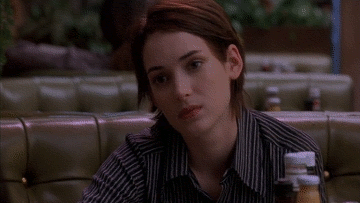
–
20 Years Later, Troy Is The Worst
The first time I watched Reality Bites as an impressionable 11-year-old, I remember rooting for Troy. Michael was a square, an MTV-lite sell out who ruined her art and embodied everything bad about the man. Troy was the cool guy. He should get the girl.
Watching it 20 years later, the entire experience is different. The opening credits start to roll, and you’re already asking yourself, ‘Wait. Is Troy Dyer one of the most insufferable douchebags ever?’
And yep, he is. Of course he is. The film’s idea of Gen X is more contradictory and complex than Karl Stefanovic, but there’s one thing that’s definite: Troy is a complete douchewad.
Exhibit A, a scene which occurs after he sleeps with his friend and then treats her like crap:
Troy is the guy whose heyday is the raging hormonal freedom of university, where he can impress girls with first-year philosophical nonsense, spout statements about creating art, use long words in order to appear smarter than everyone, and hide behind a veneer of sarcasm and irony. Like every other scared 23-year-old male who doesn’t know how to deal with his emotions, he hides his feelings for Lelaina at every chance, and turns up the ‘asshole’ around the guy who might actually get her.
Troy is the guy who — at a GODDAMN FAMILY DINNER with his friend and her divorced parents — responds to a question about gifts with a sneering, “Well, actually, my father’s dying of prostate cancer so I don’t really trouble him much for gifts.” He’s the guy who — after Lelaina comes in from a nice evening with Michael — turns his butthurt into emotional terrorism: “I am really in love with you…” *waits a beat* **waits longer** “Is that what you want to hear? Well, don’t flatter yourself.”
Lelaina should’ve throat-punched the greasy little fucker right then and there. Instead she eventually forgives him, and he even gets in a sneaky kiss.

In his defence, though, Michael is a massive douchepacket too.
–
20 Years On, Who Would Be Happier Now?
For all of Gen X’s intentions of not selling out, they did. Hard. 20 years on, their worries aren’t so much true love, ‘the man’ or ‘follow your dreams’: it’s kids, mortgages and super… At least we’ll always have Lisa Loeb.
Considering that Troy and Lelaina definitely broke up about five months after they moved into the nice house they had at the end of the movie — after Troy’s passive aggressive bullshit and quasi-philosophical putdowns became too much for her — here’s where each of the characters are, 20 years later.
Vickie: Married with three kids, living in the ‘burbs and working at The Gap’s head office as a lead product planner.
Michael: Divorced father of two, became Walter Mitty.
Sammy: Finally got to live his life, reconciled with his mum, runs a successful IT start-up and is in a committed relationship with a guy named Paul.
Troy: Never ended up traveling the countryside with Hey That’s My Bike, like Woody Guthrie. Remains in Houston, bartends for a living, still owns dubious facial hair. Now hosts a podcast to use his long words, and is thinking of making a go of stand-up comedy. Still lives in a share house.
Lelaina: Moved to New York after she broke up with Troy; is either now Vice President of programming for AMC, or head writer at SNL.
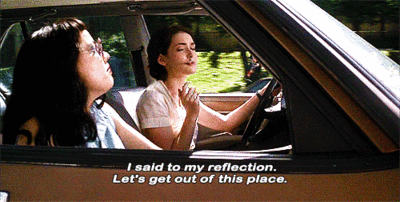
–
Jaymz is a New York-based writer, super-yacht enthusiast, hi-tech jewel thief and Bengal tiger trainer. He enjoys wearing monocles, finely spiced rum, constructing pillow forts and zip-lining from Hong Kong skyscrapers.